Monday 5th October 2020

Transport Secretary Grant Shapps rolled out the usual sound bites when launching the Emergency Recovery Measures Agreements (replacing Emergency Measures Agreements) on the breakfast media round a couple of weeks ago.
This is what he said on BBC Radio 4’s flagship Today programme:
“Today we’ve ended the franchise system after a quarter of a century. I think it worked well in terms of doubling the passenger numbers and doubling the miles that people travelled. Before the coronavirus we’ve never seen it so busy. In fact quarter one of this year was the busiest ever on our railways. So it was successful in that sense. On the other hand I think it had become too fragmented; too complicated; impossible to know which ticket to buy. If you go to a station there’d be three different machines offering you three different tickets to the same place often, and we said in our manifesto we wanted to end that and simplify the system and these recovery contracts today as you rightly point out are in response to, of course, coronavirus but they’re also in response to our manifesto pledge to end that complicated system.”
Justin Webb put it to Shapps that it’s been said by rail professionals, including Sir Michael Holden earlier in the programme, that in the long term, concessions might be fine for a city region but are not flexible enough for longer inter-city journeys where marketing techniques and incentives ought to be in place. Shapps replied:
“I think you can set up concessions in many many different ways and we’ll say more about this when Keith Williams’ report comes out as a White Paper but in the meantime what I can tell you is that I think it isn’t incompatible with the idea that you should be able to incentivise more people to use the railway through that enterprise and so on and so forth and that you should be rewarded when you run trains on time. The thing which, when I became Transport Secretary just over a year ago, I was most fed up with as a commuter was just the idea that the trains, at times, the only reliable thing about them was that they were unreliable. And we just should be able to run trains on time and these contracts will be a big step towards that because the payments will come when the service is delivered. The management contract won’t pay out if the train companies don’t deliver the trains on time, passengers on time, and bring innovations in the longer run.”
It’s instructive to dissect the sound bites in these replies.
“We’ve ended the franchise system”. Well in one sense that’s true – in that Train Operating Companies are now under a different ‘emergency’ financial regime – but the legality of franchises very much hasn’t ended with negotiations continuing between the DfT and each franchise holder over how much they must hand over to be released from the previously agreed financial obligations.
Meanwhile thousands are being spent on branding by the franchise holders as though nothing has changed – eg East Midlands Railways busy applying purple vinyl to its trains as shown above. What’s that all about if franchising has “ended” and we’re going to end the “fragmentation”? Why do we now need these separate ‘franchise’ names at all now?
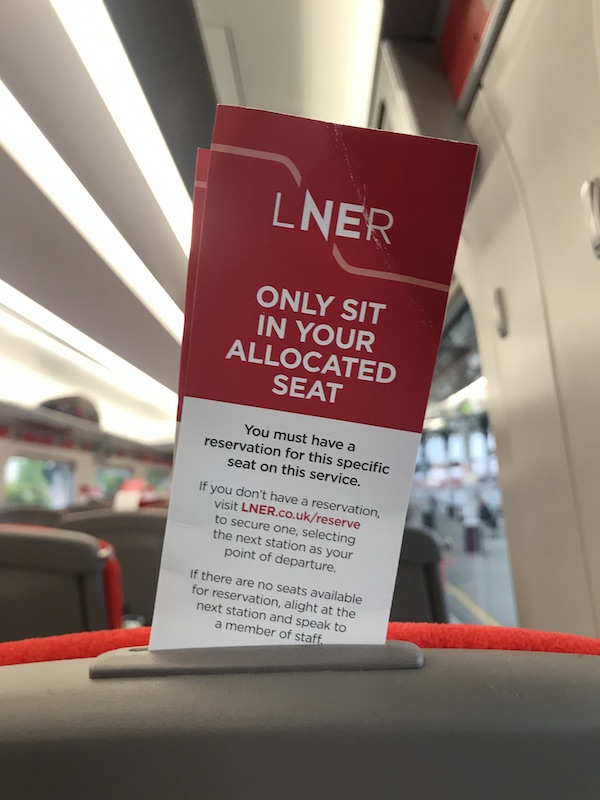
Passengers see different ‘franchise’ regimes continuing pretty much unchanged – for example, seat reservations are now compulsory for all journeys on LNER; are strongly recommended on Avanti West Coast while no seat reservations are possible at all on GWR or East Midlands Railway (“no specific seat reserved”). So much for ending “too fragmented; and too complicated” – these differing rules have been introduced under DfT controlled EMAs.
There’s no doubt the franchising regime had outlived its usefulness, mainly because of over optimistic bids, encouraged by the DfT, as well as DfT micro management. The fear for a future structural model is the DfT won’t become sufficiently hands off leaving professional rail managers to run the railway as in British Rail days.
Another ‘too fragmented and too complicated’ sound bite: the “three different tickets to the same place”. Perhaps it’s Gatwick Airport he’s thinking about where Gatwick Express, Southern and Thameslink – all operating under the one Govia Thameslink Railway (GTR) management contract – famously charge different prices for the same journey either to Victoria or London Bridge (both called London Terminals). But, as we all know, it’s Grant Shapps and his DfT mandarins who’ve controlled everything about the GTR management contract including tickets and prices. This has been the case since 2015. The DfT have done absolutely nothing to sort out this ‘fragmentation and complication’ for the last five years. In fact they’ve encouraged it to maximise income on the rip-off Gatwick Express.
The situation has been eased by default since March following the Covid inspired demise of the Gatwick Express service, albeit it was due to be slimmed down while Gatwick Airport station is rebuilt and expanded over the next couple of years.
So the answer to ticket fragmentation and complexities is in the DfT’s hands and had been under the erstwhile franchising regime.
There’s also still no sign of last year’s much heralded rail fares reform. With numbers travelling still way below ‘normal’ levels, it’s the ideal time to implement such a ‘revolution’, especially with revenue risk now with Government rather than franchise holders.
The “three different ticket machines” sound bite? That must be St Pancras where you can opt to buy a ticket from machines operated by East Midlands Railways, or if you prefer, Southeastern. They’re even placed side-by-side to emphasise the ‘fragmentation’.
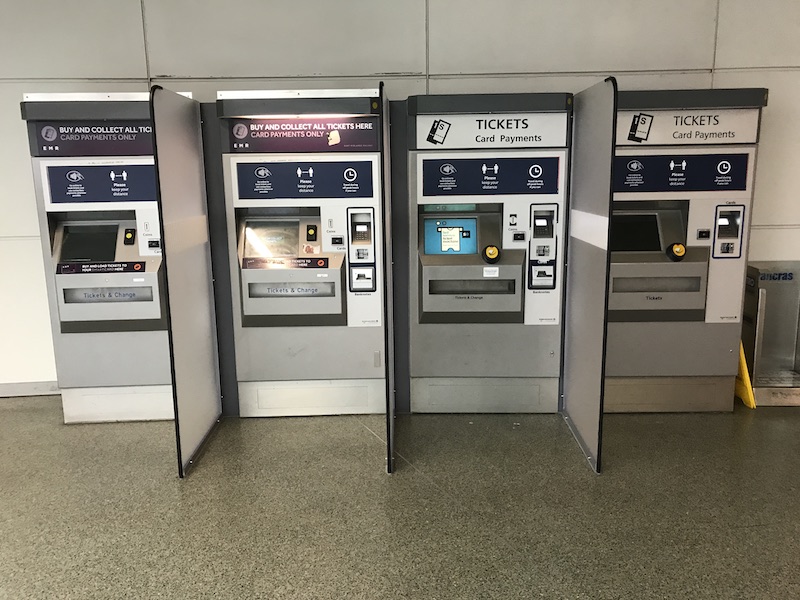
Or if you really want, you could buy a ticket from a nearby Thameslink ticket machine (still in First Capital Connect colours for any brand aficionados); well you could, if it was working.
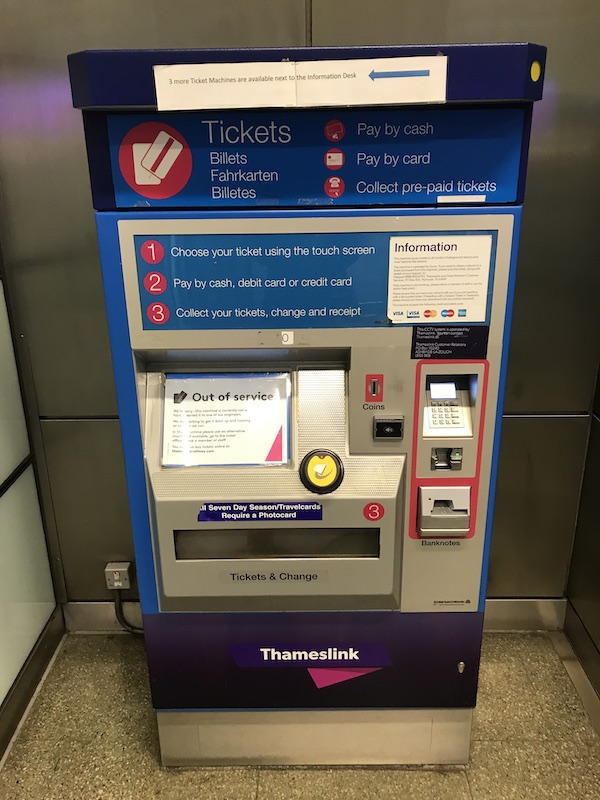
All three ticket machines sell the same tickets. All the revenue from sales goes to Government under EMAs and now ERMAs so it makes no difference what brand name appears on the machine.
Not only that, but the Network Rail run station at St Pancras offers passengers the choice of two ‘National Rail’ ticket offices located side-by-side – one operated by GTR’s Thameslink and the other by East Midlands Railways.

As the DfT owns Network Rail and has been intracately overseeing GTR’s Thameslink contract for the last six years, you’ve had thought this anomalous example of fragmentation would have been resolved by now. All the more so as a year or so ago the EMR ticket office was moved to its curent location from round the corner to create more third party retail space in the station. The opportunity could easily have been taken at that time to merge the two offices into one.
Then we come to Shapps’ oft quoted: “I only want to run the trains on time” sound bite. When challenged about this in the Transport Select Committee back in June – Chairman Huw Merriman put the point “have you considered not going back to the full timetable to put some slack in the system so that it can run more to time?” – Shapps was unequivocal replying:
“No, we need to get back to the full timetable and we need to make the system run more efficiently, which is in the longer term, fewer less fragmented organisations involved, more technology, higher quality standards and better recovery from incidents.”
The formal DfT announcement in Shapps name issued on 21st September on setting up the ERMAs stated: “complying with current public health guidance, I have also asked operators to run almost a full capacity service, to ensure there is space to help passengers travel safely while we continue to combat the threat of Coronavirus”.
The congested Castlefield corridor through Manchester simply doesn’t work on the full timetable. The operational capacity is breached. By returning to a full capacity service, any chance of running trains on time through that corridor is a forlorn hope. When questionned about this specific example in the Transport Select Committee in June, Shapps replied £350 million was being spent to upgrade a large section of the East Coast Main Line to digital signalling. So that’s OK then.
Since then money has been allocated to review the Castlefield problem and meanwhile Transport for the North are reported to be considering whether to reduce the number of trains through the corridor.
The infamous Williams Review was set up by No-ferries-Grayling in October 2018 as ‘a root and branch review of Britain’s railway’ following the May 2018 timetable meltdown. Keith Williams gave a detailed update on his thinking well over a year ago in July 2019 but his completed Review has yet to be published. Shapps told the Transport Select Committee in June 2020 when asked for an update on a publication date:
“We would have released a White Paper already were it not for coronavirus. Now we’re holding the entire network in our hands we can do things more quickly – before the end of the year I’ll have more to say. I’m not sure what form it might take, we might not need a White Paper.”
Shapps also said he was “working with Keith every single week to work out the best way to accelerate this work and coronavirus has sped things up”.
Puzzled? I am. On the one hand everything would have been sorted “were it not for coronavirus” but also “coronavirus has sped things up”. So that’s all clear then.
Anyone thinking removing decision making from Train Operating Companies (such as it was) under the ‘broken’ franchising regime would lead to more customer orientated policies and procedures, now it’s all been ‘nationalised’ in all but name, are in for a disappointment if last week’s announcement by the RDG taken at the DfT “at the highest level” about Railcards is anything to go by.
Passengers with Railcards were explicitly told not to use them by virtue of the clear instruction to avoid public transport except for essential journeys during the three month lockdown. You’d have thought it would be a nice goodwill customer orientated gesture to meet the request made by Transport Focus to extend Railcard validity by three months. But no, the reason given being the Government are already spending a fortune keeping trains running without enough passengers travelling, so there’s no chance of any further concessions.
And on similar lines, under DfT instructions, fee waivers for changing dates of non refundable advanced purchased tickets were summarily removed by TOCs from 7th September meaning if you book a ticket for a future travel date in good faith and the Government subsequently introduces travel restrictions in different regions (‘only essential travel’) preventing you from travelling – tough, no refund nor the ability to change a travel date without a fee.
Even Ryanair are more customer orientated.
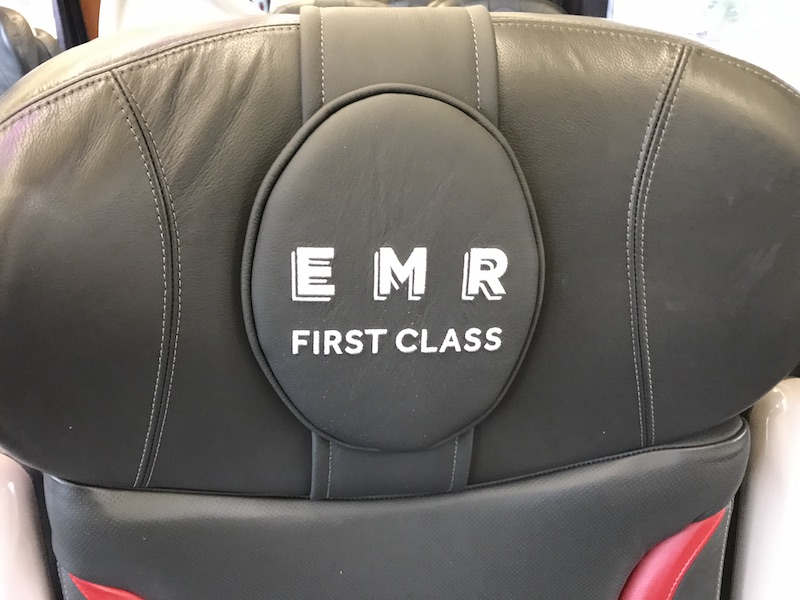
Roger French
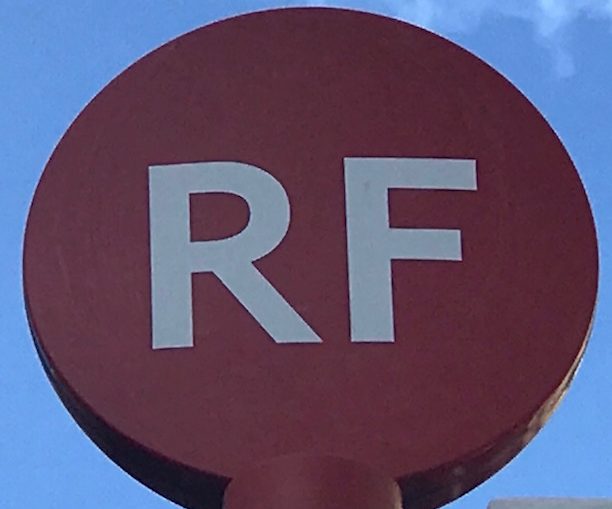

To brand trains unreliability on the operators is somewhat unfair – I refer to Shapps comment that you quoted.
Many, many delays are unfortunately down to infrastructure failings – track circuits is the usual issue (which are, admittedly, being slowly replaced by axle counters).
To call out this change from franchised operators to management contracts will suddenly eradicate delays is both naive and stupid.
If it’s staffing levels at fault, well you still have the same firms operating their relative TOCs and if it’s infrastructure to blame, then that will always unfortunately fall over every so often. And if it’s rolling stock…. well DfT decide that one anyway!
If it’s franchising or management, no doubt firms will be offered the opportunity to tender for their respective part. Sadly, no matter what industry, tendering is generally a race to the bottom. Cut a corner here, save a few pennies there…..
Privatisation has brought a lot of good to the railway. But you can’t have the same competition you can with road transport – there just isn’t the access and paths available. And, as you say with Castlefield, congested paths mean no chance of service recovery when there is even the slightest delay. Even a newspaper stuck in doors can soon snowball back for a significant period.
The railway needs capacity, whether that’s new lines or doubling/quadrupling/etc. More tracks, means trains can be spaced further on existing infrastructure, means less snowballing. But that has its own issues (witness the continual HS2 pro/con arguments)
LikeLiked by 1 person
In my view the railways lack a proper structure and management. It is far too fragmentented but just saying the current system is going does not really change anything. Operating the railways on a TFL type basis would be sensible . It means we need a body in overall control of the railways in England. This leaves a problem with cross border services to Wales and Scotland, The logical approach would be the lines fals under whichever country the majority of the route was in but clear consoltation would be needed for changes to services
Another is Network rail some people think it should be merged into the TOC’s my view is that would cause more problem than it solves. It does need beter communications between the rail cpompanies and network rail. stations are another mess probably better to have them all run by network rail
A sensible structure for the railways in England would be to say at the top a company perhaps called UK rail beneath it something similar to the old regional structure that could be further sub divided into areas. This being mainly for management purposes
The railways in England should have a coomon branding but could also carry a local operator name. Resonably standard ticketing should apply across England
The above is only one approach but from the passengers p;oint of view the railways in England should be seen as a single integrated network which would be similat to how the London Underground works
LikeLike
I’m reminded about what the Communist Party of Yugoslavia said after Marshall Tito died….”after Tito more Tito!”here the motto is “after Thatcher more Thatcher!”
LikeLike
I do strongly believe that cutting the number of interfaces on the railway is a good thing. However the DfT have shown that they add inefficiency to a lack of local knowledge to the franchised system and giving them more power will make things worse.
Little confidence in the politicians either.
LikeLike
The fares truly need sorting out. Certain journeys can be cheaper when making a longer journey on the same train, for example one I know is that a Coventry to Newtown ticket is cheaper than a Coventry to Shrewsbury ticket despite the Newtown journey being the exact same route but you stay on the train for an extra half an hour.
Plus there’s all the split ticketing such as routes from reading to Birmingham and similar dropping from £110 to £30 by splitting at Banbury (these are very extreme examples which are also affected by different off peak restrictions).
It’s great for us who know about these things but it puts people off when they see how confusing it all is and how expensive some journeys are when they could be a lot cheaper.
LikeLike
One of the biggest inefficiencies on the railway seems to be the ownership of the trains. Why are we allowing leasing companies to take out a slice of the profits? What value are they adding? What it means is that there is not enough incentive to get good lifetime usage out of the assets, which we see with some of the ridiculous fleet replacements that are going on now where TOCs have included in their franchise bid a commitment to replace trains that are nowhere needing replacement, often without any clear idea of where/if they can be redeployed. If it was under national ownership then this could be a lot more efficient and cost-effective.
LikeLike
The only thing anyone needs to know about the control of the UK railway is that it’s designed to allow the politicians to play trains.
It’s not about providing a public service, making money or heaven forbid actually providing a transport service.
It’s *solely* to allow politicians to play.
And that explains the whole clusterf*ck.
LikeLiked by 1 person
About 18 months ago I seem to recall that passengers were asked for their views about sorting out railway fares in England, given that the basic fares system was barely unchanged since privatisation (yes, I know that tinkerings around peak / offpeak / super offpeak return fares were implemented a few years ago, but not much else). Many folk comment about a disparity of fares by different operators over the same or similar routes, but in reality there’s more to it.
Gerard Fiennes in 1967 comments about a price from Oxford to Banbury compared with a price from Banbury to Oxford (something like 4s6d versus 4s3d), and the passenger being told “well, it’s uphill from Oxford to Banbury!”. The point is that even BR used “market pricing” where it could charge more (the rationale being that residents of Oxford earned more than those in Banbury, so could afford to pay more).
As part of the review mentioned above, I proposed that all possible journeys between all stations, so something over 6.25m values, should be priced by mileage travelled, in all cases by the shortest logical route (a debate in itself). Once a mileage value had been calculated, then the fare should be priced by reference to a “calculator”, which would charge a journey in the South East at (say) 125%; in the big non-London conurbations at (say) 100%, and on the rural lines (or where specific social hardships exist) at (say) 75%.
So, a 20 mile journey in Birmingham might cost £10; in Brighton might cost £12.50; in Inverness might cost £7.50.
Return fares would always be priced at (say) 75% of two singles. Fares that crossed the nominal boundary (so Birmingham to Banbury, for example) would need to be set by a Committee, who would meet to discuss any awkward fares, and whose decision would be final.
Advance fares would no longer be available; as the Network would effectively be nationalised, there would be no incentive for them. Similarly, all fares would be valid on all operators between two points, so the farcical situation between London and Gatwick would not apply. ORCATS would no longer be required, and open-access operators would similarly not be welcomed (although they and they alone would be able to charge different fares if they considered there was a market available). Seat reservations (only for journeys over around 100 miles) would be available up to (say) 75% of train capacity, but would be free, and wouldn’t guarantee a specific seat.
Not perfect, by any means, but much clearer than we have now; and would tailor fares more closely to the ability to pay and the level of service offered. Complex? Certainly to start with . . . the spreadsheet would be massive, but quite quickly would become accepted, if nothing else because it would be understandable.
LikeLike
Like Margaret Thatcher, I normally avoid comment or involvement in railway matters, realising whatever system is in place, you can NEVER win. Unfortunately, my ex-classmate, John Major, DID get involved against all sound advice. But having worked for British Railways and then into privatisation, and seeing the difference, I can understand why Politicians (even though they never understand anything about public transport other than Railway First Class “freebies”) did want to break up the former. On my first day at BR, having worked in the comparatively efficient disciplines of the bus sector for thirty years previously, I was totally stunned by the sheer bureaucracy and inefficiency. Total inflexibility of working patterns in ALL sectors, arcane agreements which had probably originated in Isambard Kingdom Brunel’s office, clung to as limpets under a ship, and frequently, staff requirements, particularly those of Drivers, taking precedence over the fare paying public. I was also astonished to find revenue collection featured at the very bottom of the list, the “accountancy” done individually in each office actually came before attempting to collect fares and keep said office window open! I could write a book, but in short, it was both a nightmare and a very big eye-opener, as was rail replacement “fiasco” I became involved with later. The massive increase in patronage and lowering of costs since those days by the private sector (think Virgin particularly) has shown privatisation not to have been a complete failure, but it is even more clear that those pulling the strings and providing the soundbites for Master Shapps these days at the DfT, really need the overhaul if we are to get a truly modern railway.
LikeLiked by 1 person
Virgin lowering costs? You have got to be kidding! Their poaching of drivers from other companies was almost single-handedly responsible for the 1997-2007 salary merry-go-round which massively increased salaries across the passenger TOCs in the first decade of privatisation. If Virgin hadn’t existed, train drivers today would be earning at most about two-thirds of what they currently are, and since the rest of the industry (including managers) hangs their pay deals on the back of the drivers’, the same would apply to the rest of the industry too. That’s a massive proportion of the industry’s fixed costs which can be laid at Virgin’s door.
Virgin did quite successfully con a load of people into believing that Branson was the only person who could run the railway and it would all collapse without him, though…
LikeLiked by 1 person
These were the same Drivers presumably whose days work sometimes consisted of moving an empty train from the platform to the sidings because the concept of flexible hours/rostering had yet to be introduced. My references to Virgin were aimed at the “massive increase in patronage” comment, and the lowering of costs applied to ALL companies. Personal dislike of Branson and his ridiculous “Showman” techniques is pretty widespread with those of us who were at the sharp end of the business, but Sir Brian Souter made the profound comment not so long ago that, “if I could run my trains as I can my buses, costs would tumble”. And he knew what he was talking about.
LikeLiked by 1 person
Flexible hours and rostering were introduced for drivers across the railway way back in 1982 after a massive dispute which ASLEF comprehensively lost. Virgin’s propaganda may well have claimed otherwise, but the only significant changes after privatisation was that the the flexible 7-9 hour working day became a 5-11 hour working day.
Oh, and the 5 day week reduced to a 4 day week because the overall hours worked per week reduced from 39 to 37 or even 35…
Doesn’t matter how little work those drivers did or didn’t do, the fact is that Virgin massively increased wages across all grades and created a nationwide spiralling of salary costs across the passenger industry. The UK taxpayer was badly served by Virgin Rail Group – and it’s worth noting that Sir Brian Souter was quite happy to allow Virgin Rail Group to continue with those spiralling costs because at the end of the day it was only taxpayers money.
LikeLiked by 1 person
I think as far as fares go you need to separate short commuter service from the longer distance services,. You need advance tickets on the longer distance services and fares could be variable depending on demand. Costs are the same whether a train is empty or full. Commuter service are more a turn up and go service so need a simple fares structure
Perhaps Network rail should be responsible for al the infrastructure. Depots, Stations and rolling stock. It also should give the benefit of scale with much greater purchasing power. Better forward planning would help to keep costs down as well. Currently the train building companies have little visibility of their forwards load with rollout stock being ordered on an almost ad hoc basis
Design of signalling system etc tends to be generally poor and lacks robustness and redundancy. Signalling kit is service critical and safety critical so should be highly robust. The biggest issue is trackside equipment. That operates in a very harsh environment with bump and vibration, moisture ingress and extremes of temperature, As little as possible of signalling equipment should be trackside
Than old track circuiting is a reliability issue. Whilst axle counters are a small step forward they are not actually much more reliable than track circuiting so even they are not a long term solution
LikeLiked by 1 person